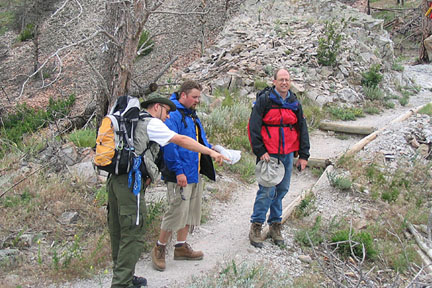Courses
The following is the planned schedule of course offerings for the Department of Earth Sciences.
Please note that some courses are offered in both the Fall and Spring, some courses are offered in the Fall or Spring only, and some are offered in alternating years. Special Topic (ESCI 4/ 5/ 60095 ST:) course descriptions are available at the bottom of the page.

Please contact the department office, undergraduate advisors, graduate coordinator, or the course instructor for additional information regarding offered courses. This plan may change during the course of a semester. Check back here for changes.
Earth Sciences Course Descriptions
Check the Schedule of Classes for current course schedules.
Basic Science Core Courses Offered Each Semester
- ESCI 11040 (3) How the Earth Works 100% web sections available
- ESCI 11041 (1) How the Earth Works Lab (pre or co-requisite: How the Earth Works)
- ESCI 11042 (3) Earth and Life through Time (optional field trip) 100% web sections available
- ESCI 11043 (1) Earth and Life through Time Lab (pre or co-requisite: Earth and Life through Time) (optional field trip) 100% web sections available
- ESCI 21080 (3) All About the Oceans 100% web sections available
- ESCI 21062 (3) Environmental Earth Science 100% web sections available
Courses Offered Primarily for the Earth Sciences Major
- ESCI 23063 (4) Earth Materials I (Fall at Kent Campus, Spring at Stark Campus)
- ESCI 31080 (4) Structural Geology (required field trip)
- ESCI 34061 (4) Principles of Paleontology (Fall at Kent Campus, Spring at Stark Campus) (required field trip)
- ESCI 31070 (4) Earth Materials II (Spring at Kent Campus, Fall at Stark Campus) (required field trip)
- ESCI 32066 (4) Geomorphology (next offered Fall 2026)
- ESCI 44070 (4) Sedimentology and Stratigraphy (Spring)
- ESCI 41092 (6) Summer Field Camp (next offered summer 2025)
- ESCI 42030 (3) Remote Sensing (cross-listed with Geography)
Earth Sciences Upper Division and Graduate Course Offerings Plan
Fall 2025
- ESCI 4/5/72030 (3) Remote Sensing (cross-listed with Geography (GEOG 4/5/79230)
- ESCI 4/52068 (3) Contaminant Hydrology and Hydrogeology (Singh)
- ESCI 4/53500 (3) Environmental Soil Science (Gallagher)
- ESCI 4/54025 (3) Geologic Hazards and Disasters (Holm)
- ESCI 4/54072 (3) Marine Processes (Tessin)
- ESCI 60091 (1) Advanced Topics in Earth Sciences (repeatable)
- ESCI 60085 (1) Data Analysis in the Earth Sciences (Tessin)
Special Topic and Seminar Course Descriptions
ST: Earth System Science
Earth System Science refers to “a rapidly emerging transdisciplinary endeavor aimed at understanding the structure and functioning of the Earth as a complex, adaptive system”*. The development of this field began with the awareness that life of Earth exerts a control on the physical and chemical environment. The course will begin with an overview of the history of this effort, which provides context for the state of the art of our understanding of the Earth system. In this course, traditional disciplines including geology, oceanography, biology, and atmospheric science, which examine components of the Earth system in isolation, will be reviewed before building towards a unified understanding of the Earth system. The course will also explore the impact of human advancements and civilizations on altering this system in an unprecedented manner. Course concepts will include planetary boundaries, feedbacks, and tipping points. During this course, students will read and discuss papers exploring multiple techniques of integrating the Earth system components including observations, experiments, and modelling. Ultimately, each student will produce a research proposal for a project that could bridge traditional disciplinary boundaries to investigate exciting linkages within the Earth system. Instructor: A. Tessin.
* https://www.nature.com/articles/s43017-019-0005-6#Sec8
ST: Environmental Hydrogeology
Climate change, extreme weather events, water pollution, and rising human waste all pose threats to our society and the management of environmental and water resources. To solve these issues, a thorough understanding of hydrogeology is required. In this course, you will learn about the environmental impact of hydrogeological systems, how they affect water resources, and how hydrogeological assessments can help with clean-up and remediation strategies. You will learn geological aspects for assessment, cleanup, and waste disposal site selection. You will learn about aquifer properties, groundwater measurement methods, underlying principles of groundwater flow, groundwater flow around wells, water chemistry evaluation, and groundwater flow measurements. Several environmental cleanup case studies will be examined.
ST: Computational Modeling in Geosystems
Computational modeling offers a great advantage to study past to future evolution of various processes in earth's water systems, and test and predict 'what if' scenarios related to changing environmental conditions. Students will learn about how various geophysical phenomenon can be represented and studied using computational models, and thus, allow them to use computational methods in their research studies or preparation for graduate school. Course will cover principles and hands-on computational modeling exercises of physical, chemical and mechanical processes in surface and groundwater systems. Computational packages, e.g., Matlab and Comsol Multiphysics will be used to simulate multiscale processes which occur in various earth's environments. Instructor: K. Singh.
ST: Volcanology
Volcanic eruptions are one of the principal forces that affect and modify the Earth’s surface. This course provides an introduction to the dynamics that govern the generation of magmas, their transport through the crust, emplacement and evolution in shallow reservoirs, and ultimately their eruption to the surface. Study of the physical and chemical properties of magmas, eruptive mechanisms, volcanic products, and the relationship between volcanism and tectonism will be emphasized. Case studies of individual volcanic events illustrate principles of volcanology and show the diversity in character of volcanism and its deposits we see today and within the geologic record. Finally, volcanic processes on Earth are applied to extraterrestrial volcanism, resources, and society. Probable fieldtrip. Prereqs: Earth Materials II/Petrology. Instructor: D. Hacker
